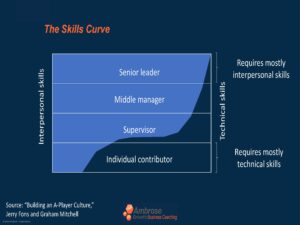“I should demote myself!” joked the head of sales. “It looks like I am better at selling than at managing a sales team.” We were looking at his team’s individual sales numbers. He was selling more when he was a regular salesperson than his whole team today.
We too often promote the wrong person into a senior leadership position. The reason is: the promotion criteria we use are poor predictors of people’s leadership potential. How can you better identify potential senior leaders and avoid painful mistakes – so you can grow faster and with less pain?
Why are we so bad at promoting the right people into leadership positions?
We are all biased. We tend to overestimate specific traits we mistakenly believe indicate leadership potential. Common biases include:
- Past successes. Unfortunately prior performance is not a good predictor of leadership performance. Research into more than 53,000 salespeople over a six-year period analyzed the promotion of more than 1,500 of them to sales managers. Researchers concluded that “while the best performers were promoted, they tended to do a very poor job as a manager.”
- Team players – which many CEOs often confuse with the ability to make consensus-based decisions. The issue is: when promoted into a senior leadership position, consensus leaders often struggle to make unpopular decisions when needed.
- We often forget that a “person’s ambition can be understated. Indeed, many exceptional leaders are modest and display little ambition, even though on the inside they are fiercely competitive. In fact, a high degree of personal humility is far more evident among exceptional leaders than is raw ambition,” according to this HBR article.
What got them here won’t get them there
Additionally, the skills required to be a successful senior leader (mostly interpersonal skills) are very different than at middle management levels, as illustrated by Jerry Fons and Graham Mitchell in Building an A-Player Culture.

Very practically: the people you are promoting into senior leadership positions will need to learn new interpersonal skills, fast. Since this will determine their success, their ability to develop interpersonal skills should form the basis of deciding who you should promote.
That is exactly what Egon Zehnder executive search Claudio Fernández-Aráoz did. He described in this and this HBR articles the 5 criteria he and his team use to predict someone’s leadership potential. Interestingly enough, none of these criteria pertain to past achievements:
- “Motivation: a fierce commitment to excel in the pursuit of big, collective (unselfish) goals.
- Curiosity: a penchant for seeking out new experiences, knowledge, and candid feedback and an openness to learning and change.
- Insight: the ability to gather and make sense of information that suggests new possibilities.
- Engagement: a knack for using emotion and logic to communicate a persuasive vision and connect with people.
- Determination: the wherewithal to fight for difficult goals despite challenges and to bounce back from adversity”
Practically speaking: what can you do about it?
When considering a middle manager for promotion into a senior position, consider using a few different tactics to rate them on these 5 criteria. For instance:
- Ask detailed feedback from their team (and uncover brown-nosers who get great results by squeezing their teams).
- Involve other people in the promotion decision (because we all have different biases). Do actual job interviews, which will let you to:
- Identify patterns from anecdotes, that can indicate a fit/misfit with a leadership position.
- Uncover hard facts and evidence to confirm or contradict gut feelings.
- Test the candidate(s)’ level of self-awareness – and check whether people’s awareness of their strengths and weaknesses align with what you hear from their team.
- Put candidates in situations when you can test abilities that they will need in their senior leadership position (eg for a special project) – but that they haven’t had a chance to display in their current role yet. Don’t assume that they lack a certain skill because you haven’t seen it in action.
Conclusion
You need the right people in the right senior leadership seats to successfully grow your business. Because of natural biases, you are at risk of promoting people based on the wrong criteria. Investing the time to reconsider your selection criteria and thoroughly vetting your candidates, can make your senior leadership team much stronger – and enable you to grow faster and with less pain.
You can access the original article and its sources here: 4 Tips to Avoid Promoting to Failure – Ambrose Growth | Business Coaching
https://www.exitplanningexchange.com/wp-content/uploads/2024/04/Large-Color-Logo5.png